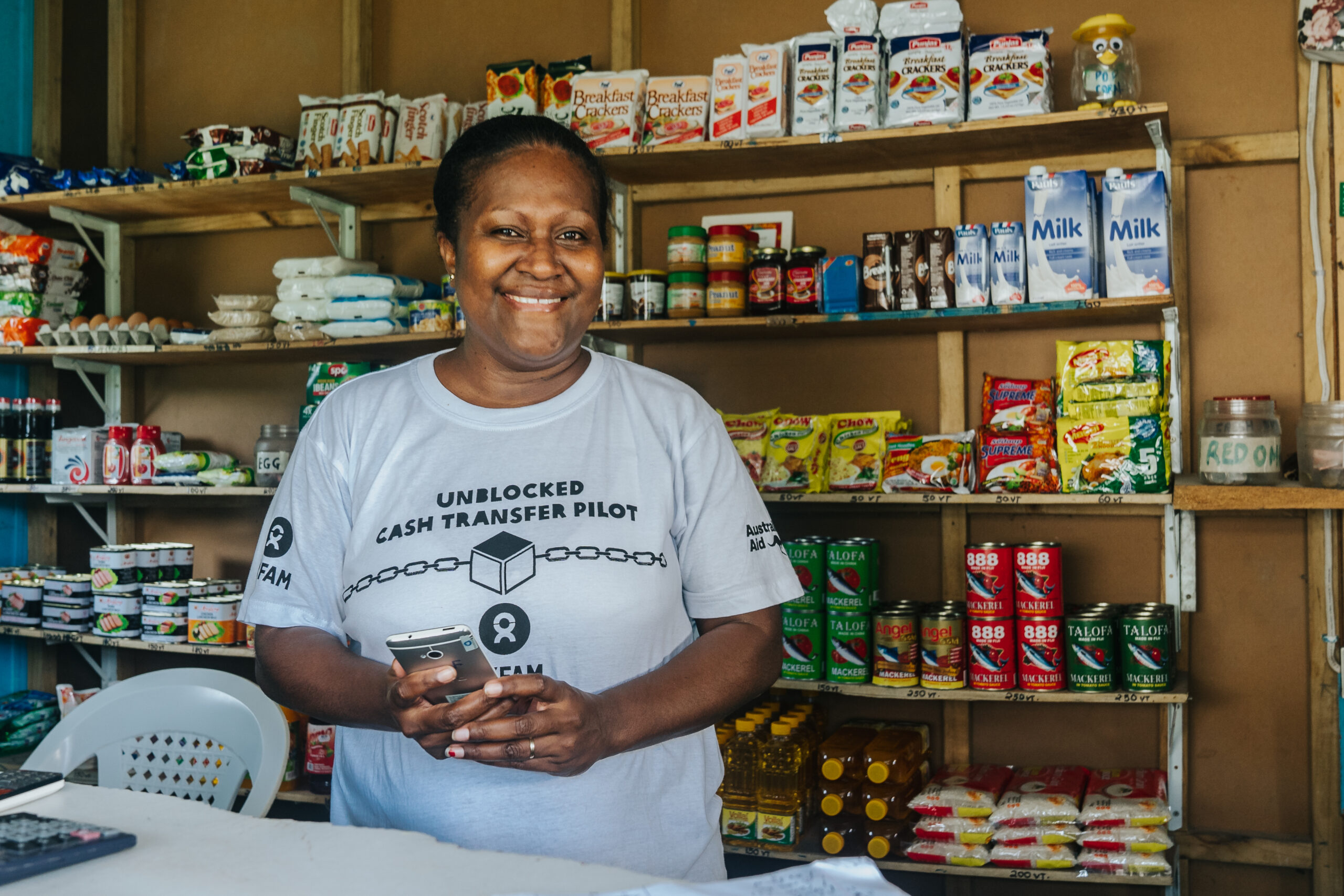Pango, Vanuatu: Super vendor Loid Albert pictured at her store during the Oxfam/Sempo/ConsenSys led Unblocked Cash Blockchain pilot. Image credit Keith Parsons/Oxfam.
From her modest storefront in Pango, Vanuatu, Loid stocks essential foods and household goods for the people in her community. Of all the countries in the world, Vanuatu is one of the most vulnerable to natural disasters, including cyclones.
When chaos hits, hard-to-reach communities across the archipelago sometimes wait weeks for emergency supplies to arrive. But now, Loid has a hi-tech solution at her fingertips that can dramatically improve her ability to react and help her community when disaster strikes.
Oxfam has partnered with tech companies Sempo and ConsenSys, to pilot an innovative cash transfer programme in Vanuatu. Powered by blockchain technology, this programme helps people bounce back faster and stronger from disasters.
Funded by the Department of Foreign Affairs and Trade Australian NGO Cooperation Program, the Unblocked Cash project equips local vendors like Loid to receive “smart vouchers” that are distributed to disaster-affected communities. Rather than wait weeks on end for help to arrive, recipients can exchange their vouchers for essential supplies from local markets.

Pango, Vanuatu: Jamiesen Kaltabang cashes in his e-voucher at Loid Albert's store during the Oxfam/Sempo/ConsenSys led Unblocked Cash Blockchain pilot. Image credit Keith Parsons/Oxfam.Oxfam’s Pacific Cash & Livelihood lead Sandra Hart says a nationwide study conducted by Oxfam found that, on average, locals had to wait four weeks or more to receive assistance after a disaster. This project’s goal is to break the model of traditional disaster assistance with cash transfers, and speed up the recovery process.
The pilot solution is a “smart voucher” powered by blockchain technology, Hart explains.
“[It] is a quick and efficient payment system to allow people to accelerate their recovery by purchasing directly from local vendors, who have been onboarded in their own community. “This will greatly reduce the time frame, not just to deliver disaster assistance in Vanuatu, but to deliver vouchers. Instead of having a lengthy reconciliation process with paper vouchers, we’ve got a smart system updating in real time.”
So far, the project has been very successful – reducing delivery times for aid to recipients by 96 per cent and cutting transaction costs by 60 per cent compared to past programmes. The cash transfer programme has already assisted over 13,000 volcano-affected households in Vanuatu.
“They didn’t have to go through the process of lining up for a bag of rice. They were able to go shopping right away in their local markets,” says Hart.
Oxfam sees this system as a way to deliver dignity and flexibility during a crisis. When people receive assistance through the cash transfer platform, they have the freedom to choose what their families need rather than relying solely on standard disaster relief packages like rice and tinned fish. Locals can continue frequenting their usual markets, selecting items based on their own traditional eating habits and needs, and supporting the local economy to recover quickly in the process.
This system provides Loid, and other local business-owners like her, the reassurance that while they may not have any control over when a disaster hits, they can finally control how they respond to it.“A programme like this will make a big change and a huge impact on the lives of the locals if a disaster happens again,” she says.
Oxfam is one of the first humanitarian organisations to use blockchain technology for cash transfer programming in the Pacific region. Oxfam's Sandra Hart explains, "The pilot solution, in the cash transfer context, is a form of voucher, except in this case; because it is powered by blockchain; it is a smart voucher. So, using those smart vouchers is a quick and efficient payment system to allow people to accelerate their recovery by purchasing directly from local vendors, who have been onboarded in their own community". Image credit Keith Parsons/Oxfam. 






